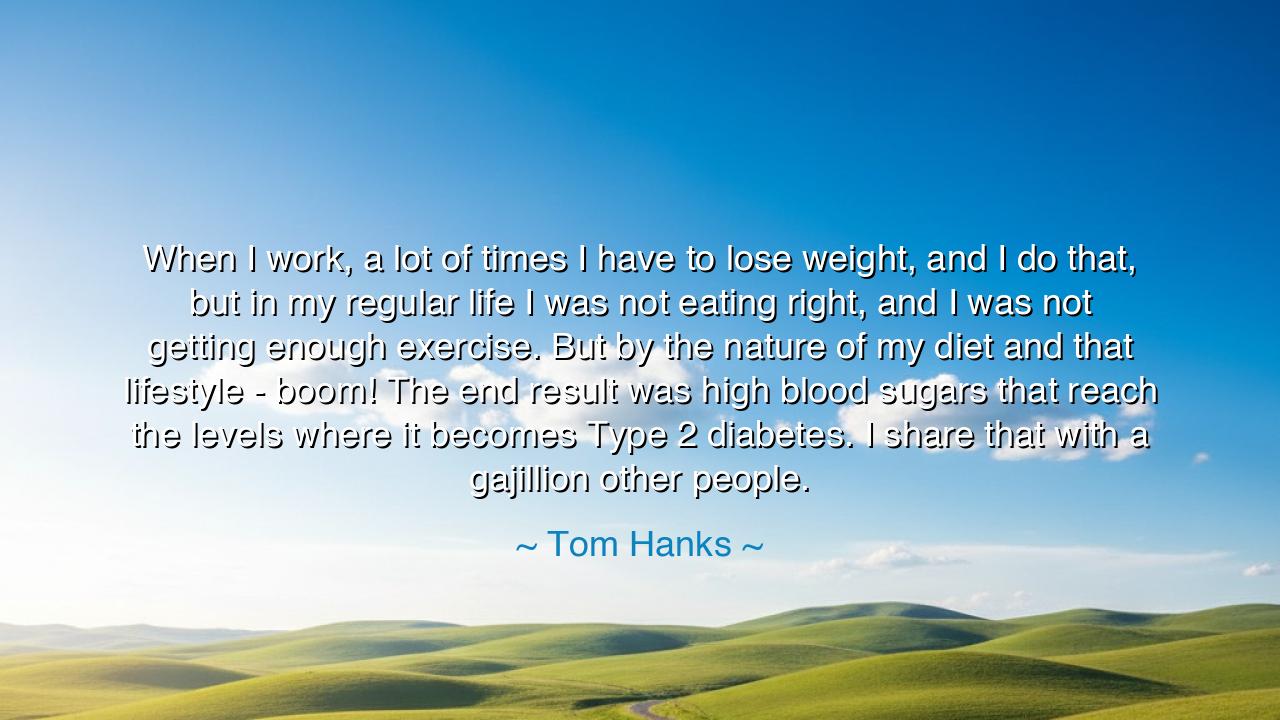
When I work, a lot of times I have to lose weight, and I do that
When I work, a lot of times I have to lose weight, and I do that, but in my regular life I was not eating right, and I was not getting enough exercise. But by the nature of my diet and that lifestyle - boom! The end result was high blood sugars that reach the levels where it becomes Type 2 diabetes. I share that with a gajillion other people.






In the struggle for balance, there lies a truth that rings throughout the ages: the body is a delicate instrument, requiring the careful stewardship of both diet and movement. Tom Hanks, one of the finest actors to grace the stage and screen, speaks of a profound journey—a journey that mirrors the path of many, where the demands of life and work push one to achieve great feats, yet often at the cost of one's own well-being. His words, “When I work, a lot of times I have to lose weight, and I do that, but in my regular life I was not eating right, and I was not getting enough exercise,” reveal a tragic truth that resonates with all who seek to balance ambition and self-care.
Indeed, this is the tale of a man who, in the pursuit of his craft, has learned to shed weight and meet the demands of his career. But what of his regular life? What of the moments when the intensity of work gives way to the mundane, when the focus on the self is lost in the rush of daily routine? Hanks admits that in those moments, he did not nourish himself as he should, did not move his body as the ancient philosophers would have counseled. And thus, through the neglect of his health, his body turned against him, and high blood sugars crept slowly into his life, leading him to the diagnosis of Type 2 diabetes. This, dear reader, is the warning of our time—how easy it is to lose sight of our health amidst the noise of the world.
Consider, for a moment, the example of Alexander the Great, a mighty ruler and conqueror whose body was said to be strong and healthy in his youth. Yet, in his later years, as his empire grew vast, his physical health deteriorated, a result of the stresses of his campaigns and the excesses of his lifestyle. His eventual decline—marked by excessive drinking and indulgence in rich foods—was a silent disease that gripped him, much like the unseen force of diabetes that now touches so many of us. Alexander, for all his conquests, could not conquer the neglect of his own body. And so too, many of us, like Hanks, suffer the consequences of neglecting the basic principles of self-care in the name of productivity or success.
Hanks’ words ring out not just as a confession but as a call to arms, a realization shared by a multitude of souls: the battle for health is not a fight of grandeur but a quiet, daily commitment. “I share that with a gajillion other people,” he says, and indeed, his struggle is not his alone. In the great tapestry of humanity, we are all bound by the same truths: if we do not honor the body with good food, sufficient exercise, and rest, it will falter. The tale of diabetes, like many diseases of modernity, is not one of fate but of choice. The choices we make in each moment, whether we eat or move or rest, can either lead us toward health or, as in Hanks' case, toward illness.
In the words of the ancient Greeks, “A sound mind in a sound body.” To be whole, to be truly healthy, one must tend to both the mind and the body. The mind requires discipline in thought, and the body requires discipline in care. We must not let the pursuit of our goals blind us to the simple truths of self-care. The lessons of the ancients are clear: we are stewards of our own vessels, and the choices we make each day shape the course of our lives. If we neglect the body, it will rebel. If we fail to provide it with the fuel it needs—food, exercise, rest—it will falter in ways we cannot always predict.
The lesson here, dear reader, is clear: health is not something to be put on hold until the demands of life are satisfied, for the health we enjoy today will determine the quality of our lives tomorrow. Let us take heed of Hanks' words and remember that the pursuit of success, of wealth, or of fame, should never come at the cost of our well-being. Rather, success should be seen as part of a greater whole, one where the care of the body, mind, and spirit is central to every effort.
In your own life, let the lesson be this: treat your body with the same respect and care that you would give any other precious resource. Eat mindfully, choosing foods that nourish and strengthen. Move with intention, remembering that each step, each movement, is a gift. And most importantly, know that true success is not measured by the accolades you receive, but by the health and strength you carry with you through the years. Just as the ancients taught, live with balance, for balance is the key to lasting well-being.






AAdministratorAdministrator
Welcome, honored guests. Please leave a comment, we will respond soon